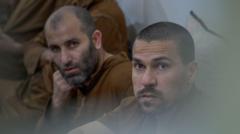As the geopolitical landscape shifts in Syria, Kurdish forces are sounding alarms over the potential resurgence of the Islamic State (IS) amid increased Turkish military operations. General Mazloum Abdi, the commander of the Syrian Democratic Forces (SDF), has raised concerns over a significant uptick in IS activities due to residual chaos after the Assad regime's fall. Reports indicate that IS militants have begun to exploit arms and munitions left by retreating Syrian troops, raising apprehensions for the security of IS detainment facilities in northeast Syria.
Abdi emphasized the "real threat" of IS attempting to break into SDF-operated prisons, where thousands of IS members are held, alongside their family members in camps nearby. Strained by ongoing assaults from Turkish forces, the SDF finds itself having to redirect resources and personnel away from counter-terrorism initiatives, aggravating worries about IS reclaiming lost ground.
Turkey's positioning in the region complicates matters further, as it views the SDF as a front for the PKK, a group it has long sought to contain. Amidst rising tensions, Turkey's military incursions have led to SDF fighters being pulled from their posts, preventing crucial counter-terror operations against IS. Abdi argued that Ankara's airstrikes pose an immediate risk to their forces and distract from safeguarding prisoner facilities.
Insights from Al-Sina Prison, where approximately 5,000 IS detainees are held, reveal a hyper-vigilant atmosphere, with layered security measures in place. The prisoners, many of whom have strongly embraced IS ideology, live under tightly controlled conditions, but fears remain that external pressures could lead to further instability.
Meanwhile, women and children connected to IS fighters are being detained in the Roj camp, where a rather eerie sense of hope brews among some residents for freedom. A detainee expressed concern for her and her child's future while voicing a desire to return to their home country, Russia, as camp dynamics shift amid fears of IS reviving its influence.
As local Kurdish civilians contemplate exodus from their homes, driven by escalating threats from both IS and Turkish-backed factions, the outlook remains grim. Young civilians express trepidation over returning to a life of displacement, with some calling for international intervention to secure their safety. Despite the turmoil surrounding them, residents emphasize the need for urgent global attention to their plight, remaining hopeful for a resolution to the growing tensions.
Abdi emphasized the "real threat" of IS attempting to break into SDF-operated prisons, where thousands of IS members are held, alongside their family members in camps nearby. Strained by ongoing assaults from Turkish forces, the SDF finds itself having to redirect resources and personnel away from counter-terrorism initiatives, aggravating worries about IS reclaiming lost ground.
Turkey's positioning in the region complicates matters further, as it views the SDF as a front for the PKK, a group it has long sought to contain. Amidst rising tensions, Turkey's military incursions have led to SDF fighters being pulled from their posts, preventing crucial counter-terror operations against IS. Abdi argued that Ankara's airstrikes pose an immediate risk to their forces and distract from safeguarding prisoner facilities.
Insights from Al-Sina Prison, where approximately 5,000 IS detainees are held, reveal a hyper-vigilant atmosphere, with layered security measures in place. The prisoners, many of whom have strongly embraced IS ideology, live under tightly controlled conditions, but fears remain that external pressures could lead to further instability.
Meanwhile, women and children connected to IS fighters are being detained in the Roj camp, where a rather eerie sense of hope brews among some residents for freedom. A detainee expressed concern for her and her child's future while voicing a desire to return to their home country, Russia, as camp dynamics shift amid fears of IS reviving its influence.
As local Kurdish civilians contemplate exodus from their homes, driven by escalating threats from both IS and Turkish-backed factions, the outlook remains grim. Young civilians express trepidation over returning to a life of displacement, with some calling for international intervention to secure their safety. Despite the turmoil surrounding them, residents emphasize the need for urgent global attention to their plight, remaining hopeful for a resolution to the growing tensions.



















